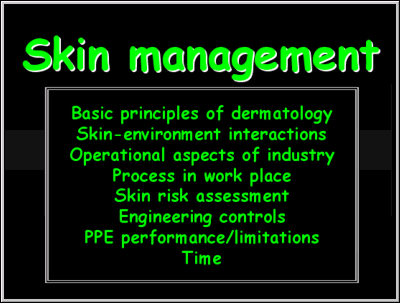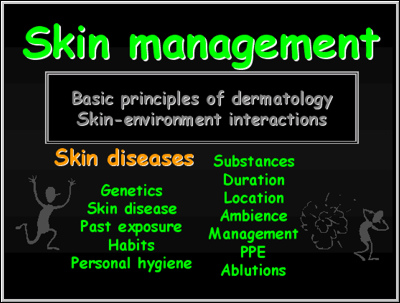 |
| |
| Module 4: Skin Management |
WHAT IS SKIN MANAGEMENT?
It must be clearly understood that skin management is not skin-care. Skin management implies that the over-arching principles of engineering the environment, educating the patient and providing for skin hygiene and protection are all addressed.
THE SKIN MANAGEMENT PROGRAM:
A skin management programme incorporates all of the following:

- The basic principles of dermatology and a good understanding of the skin and its interactions with the environment need to be appreciated.
- Operational aspects of industry, the workplace and the task involved need to be accounted for.
- A good, appropriate risk assessment is undertaken directing engineering controls.
- Finally personal protective equipment can be considered, recognising their limitations.
- It is therefore understandable that in order to be assured of a good skin management programme in the workplace, the most important ingredients needed, are time and good powers of observation and detection.
Basic principles of dermatology:
Basic principles of dermatology with special emphasis on the relationship of the skin to its environment have already been addressed in a previous lecture (refer to the lecture on skin physiology) and will not be covered here. As skin physiology and environmental interactions are so crucial to understanding this lecture and are essential to a good skin management programme, please make sure you are comfortable with the contents of the lecture on skin physiology. (If you are not, you may access it from here.
Skin diseases:
Skin diseases have also been covered in a previous lecture. Certain aspects, that were not covered in this lecture are dealt with below:

- A worker’s genetic background determines their susceptibility to disease.
- Fair skinned individuals are more likely to be affected by radiation exposure if working in the open than dark skinned individuals.
- Allergic contact dermatitis develops in genetically susceptible individuals.
- Pre-existing skin disease may render the worker more susceptible to occupational skin disease development.
- Workers with atopic eczema have abnormal skin barrier function and are more likely to develop allergic contact dermatitis or work aggravated atopic eczema due to irritant exposure.
- Workers with a background of psoriasis who develop irritant dermatitis may develop intractable psoriasis of the affected areas because of the isomorphic/Koebner phenomenon.
- Workers who have been previously sensitised to an allergen may react on re-exposure to very minimal concentrations of the compound. The sensitising concentration is much higher than the concentration provoking a reaction on re-exposure.
- Workers with bad habits that lead to repeated exposure and unnecessary contamination of the workplace, clothing and PPE are at greater risk of developing skin disease. They also put others at greater risk by increasing their chances of exposure.
- Personal hygiene reduces the risk of developing skin disease if contamination and soiling of the skin is cleaned immediately. If the worker is provided with inadequate washing and ablution facilities then the risk of developing skin disease may increase.
Knowledge of the substances used in the work place is essential for an effective skin management programme is to be instituted. The raw materials, intermediates, products and potential contaminates of the process need to be defined and appropriate information on their risks established. The type and duration of exposure and the way a task is executed may compound a risk and must be documented.
The work environment ambience, skin-care regimes and PPE can act as a hazard modifier and need to be assessed.
Management must buy into any health programme to make it effective. This limits shortcuts being taken with increased risk of exposure to known or unknown substances.




Postgraduate Diploma in Occupational Health (DOH) - Modules 3 – 5: Occupational Medicine & Toxicology by Prof Rodney Ehrlich & Prof Mohamed Jeebhay is licensed under a Creative Commons Attribution-NonCommercial-ShareAlike 3.0 Unported License.
Permissions beyond the scope of this license may be available at http://www.healthedu.uct.ac.za/


